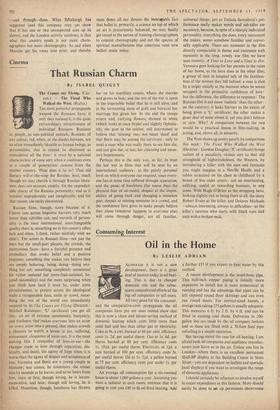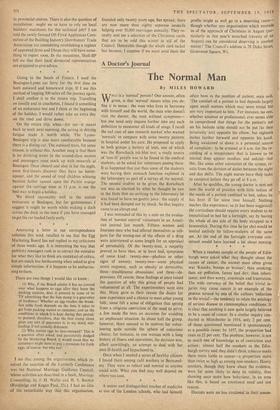Consuming Interest
Oil in the Home
By LESLIE ADRIAN.
ALTHOUGH it is not a new development, there is a great deal of interest today in oil heat- ing. This is due to cheaper domestic oils and the subse- quent concentrated efforts of the big oil companies to sell more. All very good for the consumer, and the comparative-costs propaganda the oil companies have put out does indeed shoNV that this is now a clean and labour-saving method of domestic heating which costs little more than solid fuel and less than either gas or electricity. Coke at 9s. a cwt. burned at 60 per cent, efficiency costs "ls. 2d. per useful therm. Gas at ls. 6d. per therm burned at 80 per cent. efficiency costs ls. 104d. per useful therm. Electricity at Ifd. a unit burned at 100 per cent. efficiency costs 3s. per useful therm. Oil at ls. 2frd. a gallon burned at.75 per cent. efficiency costs just under Is. per useful therm.
An average oil consumption for a six-roomed house is about 1,000 gallons a year. Assuming you want a radiator in each room, estimate that it is going to cost you £40 to fit oil-fired heating. Add a further £35 if you expect to heat water by this method.
A recent development is the small-bore pipe. This half-inch copper piping is initially more expensive to install but is more economical in running and has the advantage that pipes can be left exposed round floor skirtings and can even run round doors. For normal-sized homes, a storage tank taking 275 gallons is usually adequate. This measures 6 ft. by 2 ft. by 4 ft. and can be fitted in existing coal sheds. Deliveries in 200- gallon lots are made by the oil company tankers and as these are fitted with a 70-foot feed pipe refuelling is a simple operation.
But having stated the case for oil heating, I am afraid both oil companies and appliance manufac- turers now leave us in the air. Unless you live in London—where there is an excellent permanent Shell-BP display at the Building Centre in Store Street—you are dependent on leaflets and sporadic local displays if you want to investigate the range of domestic appliances.
I should certainly be reluctant to involve myself in major expenditure in this fashion. More should surely be done to set up permanent showrooms in provincial centres. There is also the question of installation : ought we to have to rely on local builders' merchants for this technical job? I am told the newly formed Oil-Fired Appliances Com- mittee of the Building Industry Distributors' Trade Association are considering establishing a register of approved firms and I.hope they will have some- thing to report soon. In the meantime, Shell-BP tell me that their local divisional representatives are prepared to give advice.
* *
Going to the South of France, I used the Boulogne-Lyons car ferry for the first time on both outward and homeward trips. If I use this method of lopping 300 miles off the journey again, I shall confine it to the return trip. Travelling en famine and in couchettes, I found it something of an endurance test and I think at the beginning of the holiday, I would rather take an extra day on the road and drive down.
On the return trip, when—for me—it meant back to work next morning, the saving in driving fatigue made it worth while. The Lyons- Boulogne trip is also more comfortable because there is a dining-car. The outward train, for some reason, is without this. Another snag is that there is no drinking water in the second-class section and passengers must stock up with minerals at Boulogne. Once aboard and shut in for the night, most first-timers discover they have no bottle- opener, and the sound of tired children whining because father cannot open the Pschitt orange against the carriage door at 11 p.m. is not the best way to begin a holiday.
We dined reasonably well in the station restaurant at Boulogne, but for gastronomes 1 suggest it might be worth while making a dash across the dock to the town if you have managed to get the car loaded fairly early.
* * *
Answering a letter in our correspondence columns this week recalled to me that the Egg Marketing Board has not replied to my criticisms of three weeks ago. It is interesting the way that publicity managers rush in to correct the mistakes (or what they like to think are mistakes) of critics, but are much less forthcoming when asked to give simple information, if it happens to be embarras- sing to them.
There are two things I would like to know :
(I) Why, if the Board admits it has no control over what happens to eggs after they leave the packing stations, does it pretend in some of its TV advertising that the lion stamp is a guarantee of freshness? Whether an egg reaches the break- fast table fresh depends on the time it takes to get from packing station to customer, and on the conditions in which it is kept during that period; to pretend, therefore, that the lion stamp alone gives any sort of guarantee is, to my mind, mis- leading, if not actually dishonest. '
(2) Why cannot eggs be date-stamped? This is a question often asked, and persistently dodged by the Marketing Board. It would mean that we customers might have to pay a premium for fresh eggs, of course; but why not?
* * *
I see that among the organisations which re- ceived the sanction of the Lambeth Conference was the National Marriage Guidance Council, whose activities are described in a book, Marriage Counselling, by J. H. Wallis and H. S. Booker (Routledge and Kegan Paul, 25s.). I had no idea of the remarkable way that this organisation, founded only twenty years ago, has spread; there are now more than eighty separate councils helping over 10,000 marriages annually. They re- cently sent me a selection of the Christmas cards that are to be sold this winter in aid of the Council. Detestable though the whole card racket has become, I suppose if we must send them the profits might as well go to a deserving cause— though whether any 'organisation which reminds us of the approach of Christmas in August (par- ticularly in this year's wretched travesty of an August) can. be considered deserving is another matter! The Council's address is 78 Duke Street, Grosvenor Square, WI.



































 Previous page
Previous page